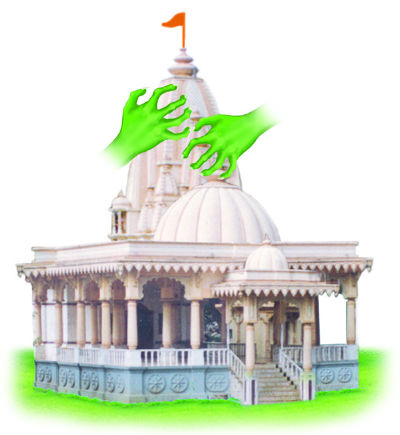Ashadh Shuklapaksha 8, Kaliyug Varsha 5115
 |
New Delhi: Jurists, advocates and other civil society leaders expressed concern over “illegal” government control of Hindu temples and analysed the constitutional rights of their administration and management at a symposium organised in the Capital on this issue on Sunday.
Swami Paramatmanandaji, secretary of the Hindu Dharma Acharya Sabha (HDAS), which organised the symposium, said HDAS had filed a writ petition in the Supreme Court challenging the constitutional validity of the different State Acts used for controlling temples. Supreme Court advocate Pinky Anand argued that provisions in the law for take over of temples by the government were invalid and not tenable.
T.R. Ramesh, president of Temple Worshippers Society, said thousands of temples having assets worth millions of dollars in States like Tamil Nadu, Andhra Pradesh and Pondicherry had been taken over by the government. “In spite of the fact that the Supreme Court in 1954 struck down the “illegal” provisions of the Madras Hindu Religious and Charitable Endowment Act 1951 related to the appointment of executive officers in temples, the same provisions were brought back by legislating the Tamil Nadu Hindu Religious and Charitable Endowment Act in 1959,” he said.
Several speakers raised the bogey of “Hindu victimisation” and “discrimination” by the government, members of judiciary and other institutions of the Indian State, while highlighting the need for equal rights to Hindus and minorities.
Former Chief Justice of Punjab and Haryana High Court Rama Jois argued that an 11-judge Supreme Court Bench had held that Article 30 of the Constitution did not confer any special privileges on minorities. “It is not a right, it is only a protection. No one category must receive preferential treatment.”
Former acting Chief Justice of Rajasthan High Court Vishnu Sadashiv Kokje argued that the issue of government control over temples cannot be solved in the Apex Court, so Hindus needed to take routes of agitation and pressure building. K.N. Bhat, the Supreme Court lawyer who represented Lord Ram in the Ram Jamnabhoomi case, cautioned that legal remedies were fraught with uncertainties.
Swami Dayananda Saraswathi, HDAS convenor, said Hindus should unite to take back control of the temples from the Government. This was the only way the Hindus can find the money to propagate the religion and withstand the onslaught of conversions by other religions.
Source: The Hindu




